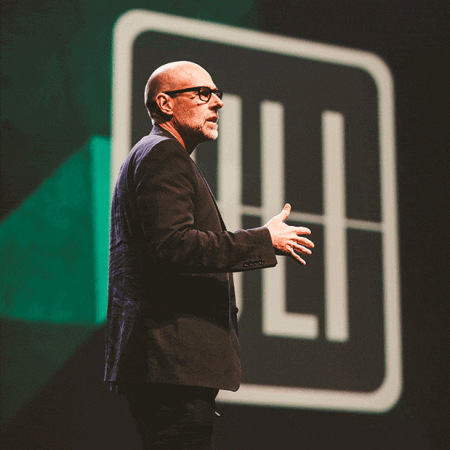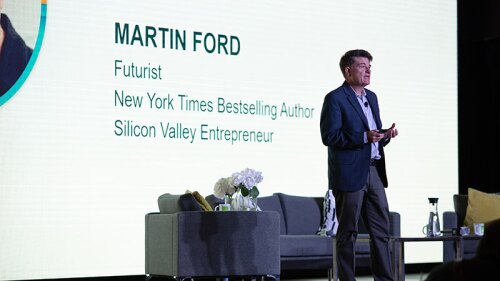Best-selling author, entrepreneur, and New York University marketing professor Scott Galloway issued an impassioned call for the government breakup of Facebook, Amazon, Google, and Apple, telling attendees at the 2018 ULI Fall Meeting that the four giants of the digital-age economy have grown too large and powerful.
Galloway, author of the 2017 bestseller The Four: The Hidden DNA of Amazon, Apple, Facebook, and Google, noted that the companies have a combined market capitalization of $3.1 trillion—bigger than the total economies of all but four of the world’s nations. In his view, the tech giants have amassed outsized earnings through business practices that ultimately have been harmful to capitalism.
“I’m going to urge you to do what Darth Vader told his son to do: ‘Search your feelings. You know it to be true,’” Galloway said. “We have a current ecosystem—Apple, Amazon, Facebook, and Google. Now, if you will, put aside your predisposed notions about what regulation means and say, Imagine an ecosystem with all these as independent companies,” rattling off a list of the big four’s components, from YouTube to iTunes to Facebook Messenger.
“Which ecosystem has more hiring?” Galloway asked. “Which ecosystem has more M&A [mergers and acquisitions]? Which ecosystem has more VC [venture capital]–backed companies? Which ecosystem has a broader tax base?”
.@profgalloway, professor at the NYU Stern School of Business, founder of @L2_Digital, and best-selling author discusses tech and it’s role in creating a prosperous society for consumers, shareholders, and corporations. Follow all #ULIFall coverage at https://t.co/8eNbr3dZC9 pic.twitter.com/9pMgtNHpYU— Urban Land Institute (@UrbanLandInst) October 10, 2018
“We don’t break them up because they’re evil,” Galloway said. “That’s [expletive], because they’re no less or more evil than we are. We don’t break them up because they destroy jobs; we need job destroyers. We don’t break them up because they avoid taxes; we all avoid taxes. We break up big tech because we are capitalists.”
Galloway, who founded the digital marketing firm L2 and numerous other companies and was a board member of the New York Times Company from 2008 to 2010, paced the stage as he delivered a nonstop fusillade of facts and figures. He said the four companies’ ability to take away the revenue stream of existing companies and discourage rival startups has contributed to an environment in which new business formation is half what it was four decades ago.
Galloway called the four companies’ positions “eerily reminiscent” of times when government had used its antitrust powers to break up other powerful giants.
“If the Justice Department hadn’t fired a flare across Microsoft’s bow in 1999, do you think Google would have gotten out of the crib?” Galloway asked. “We’d all be saying, ‘I don’t know. Bing it.”
Galloway noted with amusement that his views had earned him the sobriquet “socialist” in his frequent appearances on the Fox Business channel, despite his background as a founder of startups and a corporate board member. Galloway noted that at various times he has owned shares of Amazon and Apple and that many of his students have gone on to work for Amazon. He actually started writing his book with the intent of it being “a love letter,” but his research gradually changed his views.
While Galloway’s case for government antitrust intervention against the companies is based on what he sees as their negative impact on business, he also found fault with them in other ways. He excoriated Facebook, for example, for not doing enough in response to Russian efforts to influence the 2016 presidential election. The Starbucks chain, he noted, recently shut down all its 8,000 U.S. stores for an entire day to provide special anti-bias training to employees after a single incident in which police had been called on two African American customers.
In comparison, Galloway said, “Facebook is weaponized by a foreign government. . . . Do you think they’d close down their network for even a minute?”
Galloway also criticized Apple for avoiding taxes and noted that Amazon controls nearly half of all e-commerce, occupying such a dominant position that more Americans have an Amazon Prime membership than voted in the 2016 presidential election. But he said Google’s dominance as a search engine gives it a degree of power bordering on the supernatural.
“Imagine your name and face above everything that has been typed into that Google query box, being made public,” he said. “Google knows the real you. Your boss, your therapist, your spouse know a representative of you, but Google knows who you are. You trust Google more than any job mentor, boss, rabbi, priest, or scholar. You trust it with your most private and important questions. Google is our god.”
Galloway accused the companies of resorting to euphemistic language to hide their refusal to take responsibility for their actions. “We need to do better” translates into “We have no intention of doing anything about it,” he said.
Galloway noted that the companies’ presence in modern life is so ubiquitous that even their critics use them. “Where do they go to express their outrage? Facebook and Instagram,” he said.




